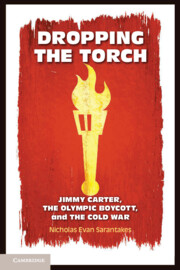Book contents
- Frontmatter
- Contents
- Acknowledgments
- Abbreviations
- Introduction Miracle on Ice
- Chapter 1 Lord Killanin and the Politics of the Olympics
- Chapter 2 Los Angeles versus Moscow
- Chapter 3 Jimmy Carter and U.S.-Soviet Relations
- Chapter 4 The Soviet Invasion of Afghanistan
- Chapter 5 The American Response
- Chapter 6 Easy Victories
- Chapter 7 Painful Losses
- Chapter 8 The White House Games
- Chapter 9 Coca-Cola, NBC, and the Defeat of the Iron Lady
- Chapter 10 The Vote in Colorado
- Chapter 11 Civil Wars
- Chapter 12 Carter versus Killanin
- Chapter 13 Moscow: The Olympics Are the Olympics
- Chapter 14 Los Angeles
- Chapter 15 Conclusion
- Epilogue
- Notes
- Bibliography
- Index
Chapter 15 - Conclusion
Published online by Cambridge University Press: 05 September 2012
- Frontmatter
- Contents
- Acknowledgments
- Abbreviations
- Introduction Miracle on Ice
- Chapter 1 Lord Killanin and the Politics of the Olympics
- Chapter 2 Los Angeles versus Moscow
- Chapter 3 Jimmy Carter and U.S.-Soviet Relations
- Chapter 4 The Soviet Invasion of Afghanistan
- Chapter 5 The American Response
- Chapter 6 Easy Victories
- Chapter 7 Painful Losses
- Chapter 8 The White House Games
- Chapter 9 Coca-Cola, NBC, and the Defeat of the Iron Lady
- Chapter 10 The Vote in Colorado
- Chapter 11 Civil Wars
- Chapter 12 Carter versus Killanin
- Chapter 13 Moscow: The Olympics Are the Olympics
- Chapter 14 Los Angeles
- Chapter 15 Conclusion
- Epilogue
- Notes
- Bibliography
- Index
Summary
History is a never ending story. As such, it can never really have any conclusion. A good storyteller, though, can make the audience think, and the political crisis of the XXII Olympiad offers many questions to ponder. Historians know that there are as many lessons in the study of the past as there are grains of sand on a beach. The events surrounding the boycott of the 1980 Moscow Olympics are no different. Grains of sand, though, do tend to lump together to form dunes, and four questions – one of process and three others of environment – loom larger than others.
What of Jimmy Carter and his presidency?
The boycott was a failure of Olympic proportions, and Carter should be grateful. Destroying the Olympics, which despite all its various shortcomings has been a positive force in world affairs, is not exactly the kind of achievement that Carter could have used to establish an enduring historical legacy. The United States government certainly had the resources to destroy the international Olympic movement, and a more competent effort could have effectively done so. The President’s technocratic approach to governance was counterproductive. He had difficulty setting priorities and often projected himself deep into the bureaucracy. The result was an inflexible approach toward foreign policy on the part of the Carter White House, rather than its reputation for indecision, that often hurt the political interests of the president. As a manager, Carter never provided the strength of character to control the Vance-Brzezinski dispute, which often resulted in him getting told what he wanted to hear rather than what he needed to know. In essence, the incompetence of the Carter Administration saved it from itself. It is no accident that most alumni of this White House make no mention of the boycott in their memoirs.
- Type
- Chapter
- Information
- Dropping the TorchJimmy Carter, the Olympic Boycott, and the Cold War, pp. 261 - 266Publisher: Cambridge University PressPrint publication year: 2010



